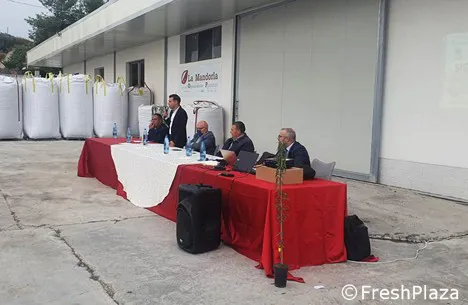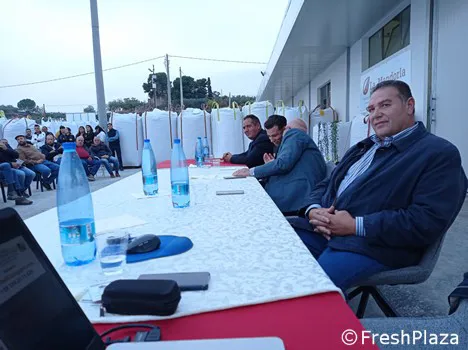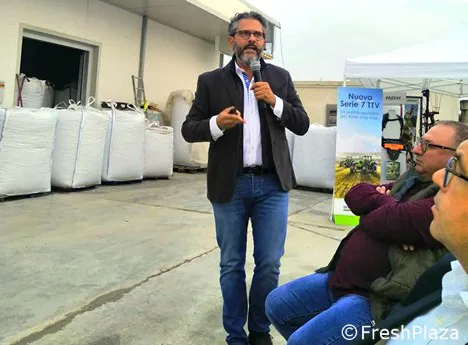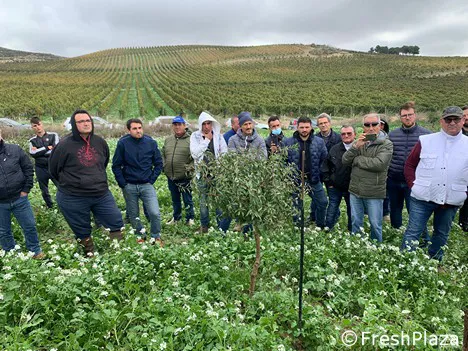Trying to match almond production in California, Australia and Spain when it comes to quantities is very difficult if not impossible, but it is actually not necessary if the focus is placed on organoleptic quality, at least when it comes to the first two. This is what emerged during the "Giornate di Mandorlicoltura" (Almond cultivation days) held in Sicily on October 23rd-25th 2021.
 The speakers' table on October 23rd
The speakers' table on October 23rd
The opening convention featured agronomist Cateno Ferreri, president of Associazione Produttori di Mandorla Siciliana - A.Pro.Ma.S., who also discussed the positioning of almonds on the shelves.
"When we place our almonds on the market, we need to differentiate between nutrition and nutraceutics - our prestigious almonds are suitable for both, which cannot be said for other products available on the European market. This is why we need to promote quality more and start the procedure to obtain the PGI mark and implement organic cultivation techniques. Despite being the leading producer in the 1960s, Italy now occupies the 4th place with a mere 3% of the total. Considering that California and Australia are flooding the global markets despite the fact that they have learned about this product only a few decades ago, it is worth relaunching the sector here in Italy as well, where we have known almonds for over 2000 years!"
 In the foreground: Cateno Ferreri, president of A.Pro.Ma.S.
In the foreground: Cateno Ferreri, president of A.Pro.Ma.S.
Vito Vitelli, who led the event, stressed that "while almond cultivation started more as an economic project overseas, it has always existed in Italy, with strong cultural roots."
"We need to restart from our cultural identity to reclaim our role on the international market, considering that one of the most important markets is indeed the Italian one, due to its culinary tradition and the presence of high-patisserie requiring top-quality products only we can provide. The market is growing, as proven by the double-digit increases in cultivated areas in Europe and in Australia. While the annual increase in Italy is of around 2500 hectares, the increase in Spain and Portugal is of 20-25 thousand hectares. This is why we need to start talking about Italian almonds, not just about Sicilian or Apulian almonds. There are now virtuous examples in Basilicata, Lazio and Sardinia, where results are very encouraging."
 Vito Vitelli
Vito Vitelli
"The opportunity deriving from POs such as "La Mandorla" in Mazzarino is the spreading of information. Knowledge must be free, and this is why we organized this event. October 24th will be destined to field visits while the 25th will include a pruning course for modern and intensive production processes. Almond groves are actual orchards, so they need the same care and dedication of a peach or apricot orchard. We need to focus on the maximum sustainability and produce increasingly healthy almonds."
There are a lot of requests in Italy (and beyond) for new orchards, but it is important to always carry out a feasibility study, especially if we consider California is witnessing an almond tree decline due to the ongoing drought. Skilled foliage management is helpful to maintain the well-being of trees and, more specifically, for sustainability and profitability reasons.
 A moment during the field visit. (Click here for the full photo report)
A moment during the field visit. (Click here for the full photo report)
"Correct pruning helps yields, but lots of things need to be changed when it comes to the current production processes to reach the correct quantity harvested per hectare. The current standard of 1 ton/ha is unacceptable, we need to triple it in the short term and increase it ten-fold with new intensive groves. This is possible with the Zaragoza system, which is working really well in Spain."
For further information:
Vito Vitelli
+39 3392511629
vitovitelli@tiscali.it
vitovitelli.blogspot.com
